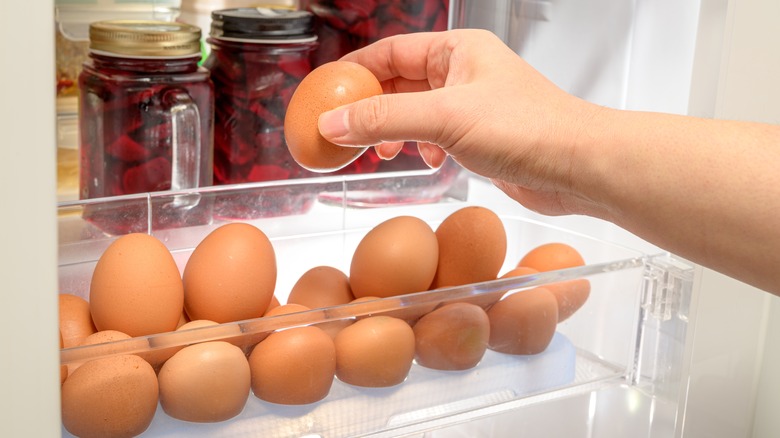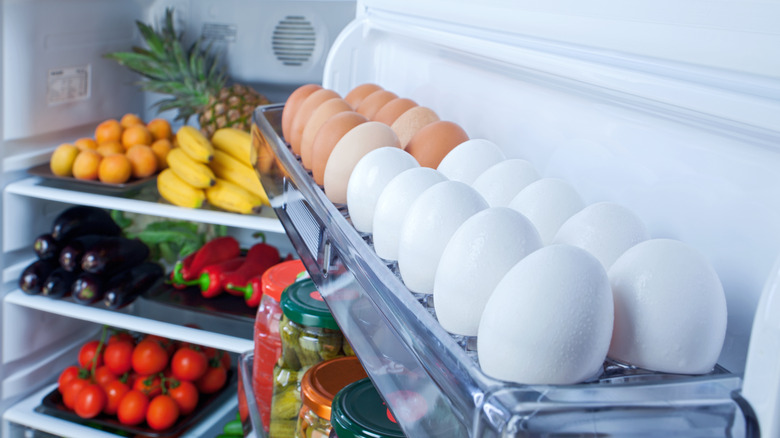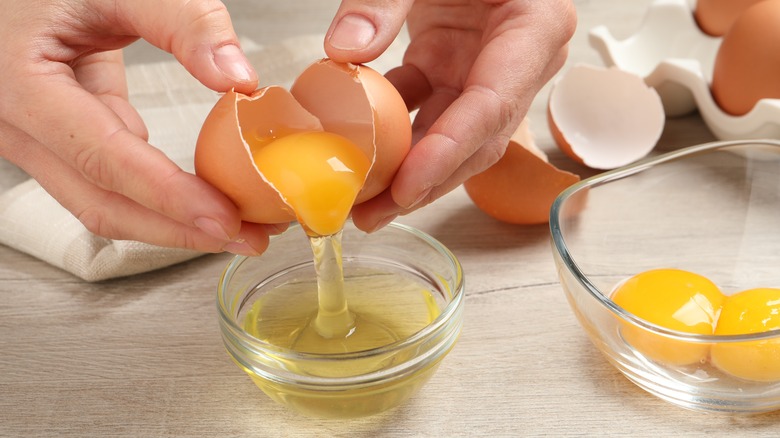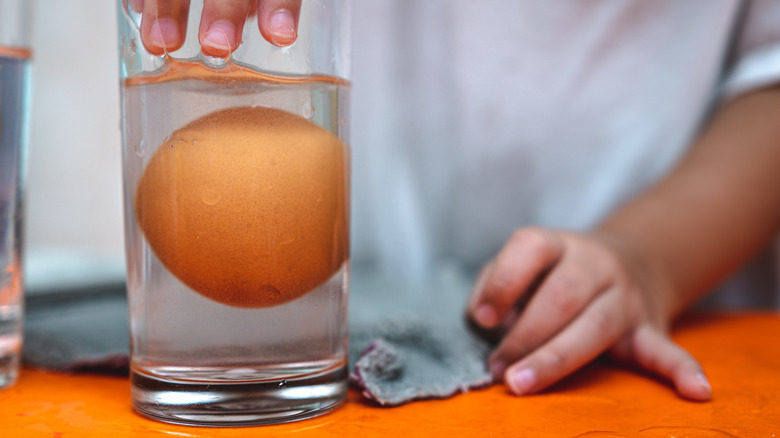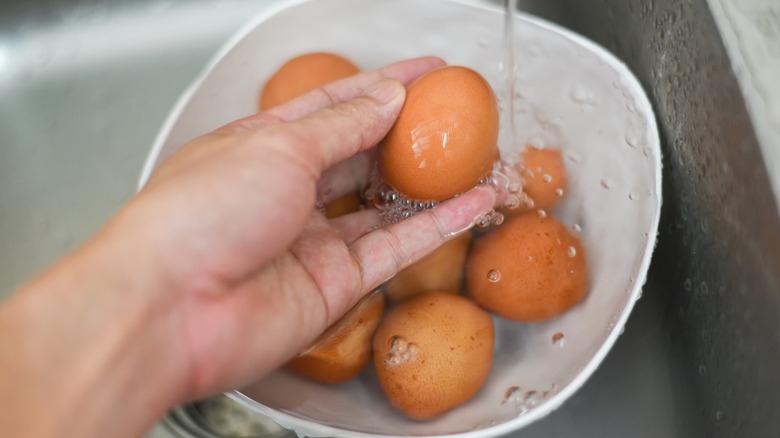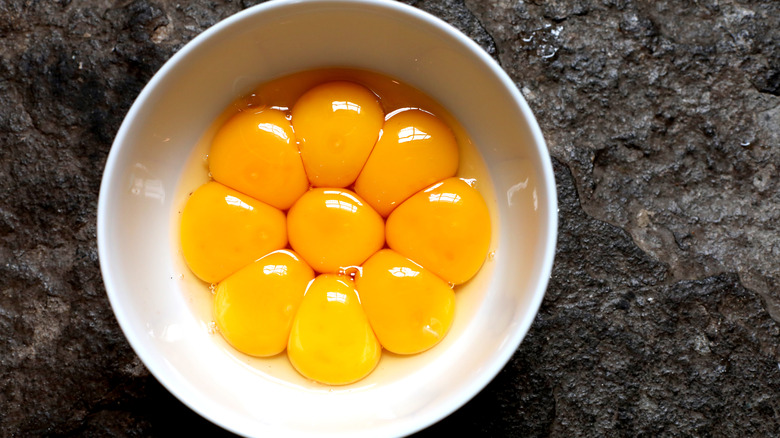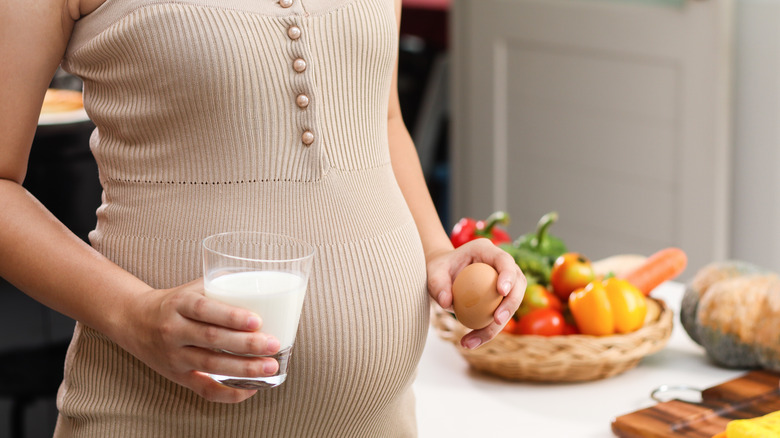False Facts About Eggs That You Thought Were True
Eggs are a staple of many diets around the world, including in the U.S. According to Statista, the average American consumed just over 281 eggs in 2023, reflecting both their versatility and ease of preparation. From simple breakfast dishes such as scrambled eggs to desserts and casseroles, eggs have a multitude of culinary applications. Moreover, the ease of cooking eggs only adds to their appeal, as they can be boiled, fried, poached, or baked with minimal effort and time.
Not just versatile in the kitchen, eggs are also packed with nutritional benefits that make them an excellent choice for any meal. They are a powerhouse of essential nutrients including vitamins A, B2, B5, and B12. Additionally, eggs are a great source of protein, folate, and selenium. Better still, this incredible nutritional profile comes with around 78 calories and 5 grams of fat per egg, depending on the size. Despite their popularity, eggs are also subject to widespread misconceptions. Not to worry — we're here to set the record straight with the false facts about eggs you might have thought were true.
False: Brown eggs are healthier than white eggs
The belief that brown eggs are superior to white eggs is often attributed to their higher prices. However, this price difference largely stems from the fact that the hens that lay brown eggs typically produce larger but fewer eggs. In reality, egg color has no bearing on the nutritional content of the kitchen staple. Both white and brown eggs contain similar nutrients, including protein, vitamins, and minerals. Eggshell color also doesn't affect the taste of eggs, which is influenced by factors like the breed of the hen, its diet, and the freshness of the egg.
The nutritional content of an egg is primarily influenced by the hen's breed, as outlined by the USDA. For instance, White Rock and Cornish chicken breeds lay white eggs, while New Hampshire and Rhode Island Red chicken breeds produce brown eggs. This being said, a hen's environment and diet can affect the nutritional content of their eggs. For instance, eggs collected from hens that spend time in sunlight have three to four times more vitamin D than hens raised indoors.
In an interview with Tasting Table, French chef and author, Jacques Pépin, states his preference for organic over commercially produced eggs, saying, "With eggs now, you can get organic eggs basically in any market, and the price is relatively inexpensive. A dozen eggs is [$3 to $5]. The organic ones [are about $1 to $2] more."
Static Media owns and operates Mashed and Tasting Table.
False: All eggs must be refrigerated
Refrigerating eggs in the U.S. is a standard procedure. In fact, they are already stored in the refrigerator at the grocery store. As such, some might find it surprising that refrigerating eggs isn't the done thing in many parts of the world. This disparity is due to the fact that in the U.S. eggs are processed in a very specific way.
After they are collected, eggs undergo a thorough cleaning process that strips away their cuticle or natural protective barrier. Ironically, while this removes any traces of dirt or feces from the eggshells, which are a potential source of contamination, it also makes the eggs more susceptible to bacteria, including salmonella. To mitigate this risk, the USDA mandates that the eggs be kept at temperatures below 40 degrees Fahrenheit after they're washed. Aside from keeping bacteria at bay, refrigerating eggs also extends their shelf life. An unwashed, unrefrigerated egg can be kept for up to 21 days while a sterilized, refrigerated egg should be safe for consumption for up to 35 days.
False: You should store eggs on the egg shelf on the refrigerator door
Although this may be counterintuitive, storing eggs in the little plastic egg-shaped cups on the side of the refrigerator door isn't the best idea. While it may keep them organized, it's also likely to decrease their shelf life and increase the risk of bacterial growth. In fact, the USDA advises against storing eggs in the rack on the side of the fridge door because this is the area of the refrigerator with the most temperature fluctuation. Just think about it, each time you open the refrigerator door, the temperature close to the door rises, affecting the nearby food items.
Instead, it's best to store eggs in their original carton at the back of the middle shelf of the refrigerator. This location is less affected by the opening of the refrigerator door and maintains a more consistent temperature, which helps to keep the eggs fresh longer. Additionally, keeping eggs in their carton not only protects them from accidental cracks but also reduces the risk of them absorbing odors from other foods.
False: Eating eggs every day is bad for your health
Since the average egg contains around 210 milligrams of cholesterol, many people believe that eating eggs on a regular basis increases the risk of heart disease. Historically, this has even led to dietary guidelines recommending a limit on cholesterol intake, with eggs seen as a significant source of the compound.
Recent studies have challenged this view, suggesting that the cholesterol in eggs doesn't have a significant impact on blood cholesterol levels. In fact, unless you suffer from heart issues or have an unhealthy blood cholesterol level, eating eggs on a daily basis needn't be a cause for concern. According to research, the majority of cholesterol doesn't come from dietary cholesterol but is produced by our liver, which is triggered by the consumption of saturated fat and trans fat. As such, it's more important to minimize the saturated fat in our diets than it is to limit the cholesterol we consume.
Regular egg intake can be a beneficial — and relatively affordable — addition to a healthy diet. Eggs are packed with protein and essential nutrients such as vitamin B12, riboflavin, and folate, making them a nutritious choice for most diets. They also contain two carotenoids — zeaxanthin and lutein — that can help protect eye health. In addition, eggs are relatively low in fat, with only around a quarter of it composed of the saturated fat responsible for elevated cholesterol levels.
False: Eating egg whites is healthier than eating the entire egg
Egg whites are high in protein and low in calories and fat, making them an attractive option for those looking to control their weight or reduce their intake of these nutrients. However, this isn't the whole story. People who opt to eat egg whites instead of entire eggs are overlooking a significant portion of the egg's nutritional value.
While egg yolks contain more calories and fat than egg whites, they're also filled with significant essential nutrients and minerals. Nutritional expert, Joy Bauer, explained why she is partial to egg yolks in a recent interview with Health Digest, saying, "After sorting through all of the research and the literature and the science and the findings, the American Heart Association now has endorsed eating eggs, yolk and all, for Americans as part of an overall healthy diet." Bauer also pointed to the beneficial antioxidants and choline in egg yolks, adding, "Choline [in eggs] helps to enhance cognitive function, mood, and memory. It keeps our brains smart and sharp, and it also helps with developing brains."
Static Media owns and operates Mashed and Health Digest.
False: You can tell if an egg is bad if it floats in water
Many of us are familiar with the egg float test. The simple method of assessing whether an egg is still fresh enough to eat is based on the idea that older eggs become more buoyant. This is because, over time, eggs lose moisture through tiny pores in the shell, increasing the size of their internal air pocket. According to the test, if an egg sinks to the bottom of a glass and lies on the side, it's fresh. If it sinks to the bottom and stands on end, it's older but still safe to eat. However, a floating egg is an indication that it has gone off and should be discarded.
While the float test can be a quick and handy trick for checking an egg's freshness, it's important to remember that it's far from being a foolproof method. In fact, according to the USDA, an egg that floats in water may still be safe to consume. Instead of tossing a floating egg out right away, the USDA recommends cracking the egg open and examining it for signs of spoilage. These can include a runny appearance with spreading yolks and whites, as well as an unpleasant odor.
False: Every egg would have turned into a baby chick
Some people believe that all eggs purchased from a grocery store have the potential to hatch into a chick. This couldn't be further from the truth — a store-purchased egg isn't going to hatch, no matter how well you take care of it. And there's a very good reason for this. For an egg to be fertilized, it must be laid by a hen that has mated with a rooster. Since hens at commercial egg production facilities normally never even glimpse a rooster, this is highly unlikely. Hens typically lay eggs almost every day, following natural light cycles, which means roosters aren't necessary for the egg-laying process.
Additionally, even if some eggs were fertilized, the conditions the eggs are subjected to post-laying, such as refrigeration and transportation, aren't conducive to incubation. As such, even if a fertilized egg is accidentally sold to you at your local grocery store or a farmer's market, there's no chance that it might develop into a chick. And if you're concerned about the egg's taste, rest assured that fertilized and unfertilized eggs are indistinguishable in appearance and flavor.
False: All eggs must be washed before use
The misconception that store-bought eggs need to be washed stems from concerns about cleanliness and food safety. More specifically, people think that washing eggs will clean them from any potential contaminants such as dirt and bacteria. In reality, washing commercially packaged eggs is completely unnecessary and can in fact increase the risk of contamination. As reported by the USDA, this is because "the wash water can be 'sucked' into the egg through the pores in the shell."
If you're lucky enough to get your hands on some fresh eggs at your local farmer's market, the story might be a little different. This is because these eggs have probably not gone through a commercial cleaning process and are covered in feathers and dirt. As such, it's best to wash them before use to ensure that none of these contaminants end up in your food.
While unwashed eggs can remain at room temperature, washing them removes — not just debris — but their protective coating. As such, it's important to either refrigerate or cook eggs once they have been washed. To prevent contamination, always wash eggs individually in hot water between 90 and 120 degrees Fahrenheit using unscented soap if desired. It's important to never wash eggs in cold water since it can pull bacteria into the shell.
False: Freezing eggs makes them inedible
If you find yourself with too many eggs on your hands, don't despair. You can easily freeze any surplus before they spoil. Just make sure to freeze them correctly, depending on how you intend to use them in the future.
Freezing eggs in their shells is a big no-no since this can cause them to expand and break, making a mess in your freezer. Instead, it's best to crack the eggs open, beat the whites and yolks together, and pour the mixture into a freezer-safe container or bag. Be sure to note the number of eggs in each container for easy use in recipes later. To freeze one egg at a time, crack the contents of individual eggs into the slots of an ice cube tray. To prevent the yolks from turning gelatinous in the freezer, mix them with half a teaspoon of salt or one and a half tablespoons of sugar per cup, depending on whether you plan to use them in sweet or savory dishes.
If you plan to use egg whites and yolks separately in your recipes, you can freeze them individually. Egg whites freeze well without a change in texture, so you can place them in ice cube trays or freeze them in bulk. Freezing egg yolks, however, requires a bit more forethought. To stop the yolks from becoming gelatinous once thawed, mix each 240 milliliters of raw yolks with half a teaspoon of salt or 1 tablespoon of sugar.
False: Eggs with blood spots are unsafe to eat
If you've ever cracked open an egg to find that it's marked with a tiny red spot, rest assured that it's still perfectly safe to eat. Found in both commercially produced eggs and farm eggs, these spots are usually caused by small ruptures in a blood vessel when the egg forms. Contrary to what some believe, they aren't an indication that a rooster has fertilized an egg. If you find the spot unsettling, simply scoop it out before cooking.
Also sometimes called meat spots, blood spots are very rare, and only around 1% of commercially produced eggs are affected. Interestingly, blood spots are way more common in brown than white eggs. The spots occur in 0.5% of white eggs and 18% of brown eggs. The reason we don't see blood spots very often is because they are normally removed during a process called candling. This typically involves holding the egg to a bright light to see through the shell. This makes it easier to spot any internal defects, such as blood spots.
False, but some caution still needed: Eggs should be avoided during pregnancy
The idea that pregnant women should avoid eating eggs often stems from concerns about the risk of foodborne illnesses, which can be particularly harmful during pregnancy. More specifically, raw or undercooked eggs can be a source of salmonella, which can cause serious problems for pregnant women. However, this concern doesn't apply if the eggs are thoroughly cooked or pasteurized.
When properly cooked, eggs are a great source of nutrition for expecting mothers. They are packed with key vitamins and minerals, such as choline, which supports the brain development of the baby. Additionally, they are rich in protein, supplying the amino acids necessary for both mother and child, as well as folate that aids in cell division and tissue growth.
Nevertheless, it's crucial that pregnant women steer clear of eating undercooked eggs. The FSIS recommends cooking eggs until they reach 160 degrees Fahrenheit or the yolks become solid. In addition, the agency advises that pregnant women should stay away from any foods that could potentially contain raw eggs, including eggs Benedict, raw batter (even licking the spoon is a no-no), homemade ice cream, and Caesar salad dressing.
False: Eggs past their sell by date are always unsafe to eat
Going over the sell-by date (also sometimes referred to as use-by, best-by, or exp. by) on the egg carton doesn't necessarily indicate that the eggs are unsafe to eat. This date is meant to indicate optimal quality rather than safety. Eggs usually remain safe to consume beyond the sell-by date, though their freshness may begin to decline. This is why it's important to always examine your eggs for overly watery whites, black or brown spots (not red spots), and foul smell since these are sure signs that an egg is no longer safe to eat.
As reported by the USDA, the cartons of commercially graded eggs must display certain information. This includes the pack date, which consists of a three-digit number from 001 or 365 that indicates the day of the year the eggs were placed in the container. The packaging also needs to display a sell-by date. As long as you purchase the eggs before that date, they should be perfectly safe to eat for another three to five weeks, provided that they are refrigerated.


